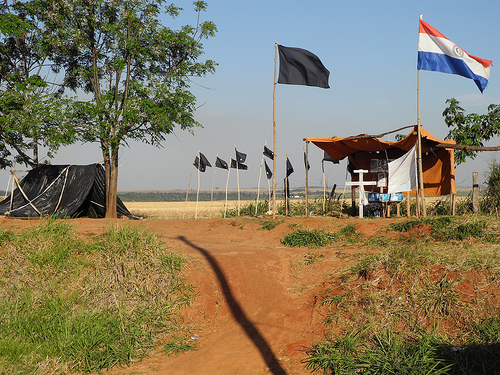On June 15, 2012, one of the most tragic events in Paraguay's recent history took place. A police raid aimed at ridding a 2,000 hectare (nearly 5,000 acres) forest reserve in the city of Curuguaty, located northeast of the capital, of an alleged illegal encampment of farm workers resulted in the deaths of six policemen and eleven farm workers.
The defunct mission, which is reported to have sent in some officers with no weapons or body armor, has caused outrage from the public and authorities alike. The commanding officers were ultimately dismissed and the event served as one of the main triggers for parliament's decision to impeach then president Fernando Lugo, who was ousted by a overwhelming majority of congress.
In the only eye-witness video [es] that exists of the tragedy, which has been circulated through the entire local media circuit, one can see police officers being ambushed by the supposed violators.
The investigation has led to the detainment of 24 people suspected of involvement in the killings; however, the persisting lack of clarity regarding what happened that tragic day has generated growing controversy in public opinion.

Curuguaty, Paraguay, August 2012. Photo credit: Flickr user, June 15th, under the Creative Commons license agreement (CC BY-NC 2.0)
Four of those arrested have since been granted house arrest [es] after participating in a hunger strike for more than 60 days as a means of claiming innocence and petitioning for freedom.
Public opinion remains divided about the actual happenings of the event, with polarized opinions found within the blogging community. Most, however, find consensus in criticizing the government for the lack of clear and relevant information and accuse the prosecutor of conducting an insufficient investigation. Jota Efeb writes on his blog Viva Paraguay [es]:
Pasaron 5 meses y nada. La sangre de los muertos en la matanza de Curuguaty no interesa a nadie dentro del Estado. Cuanto más rápido deje de hablarse del tema, mejor. Hace rato que intentan echar tierra encima y evitarse mayores cuestionamientos.
Five months later and still nothing. The blood of those that died in the massacre in Curuguaty interests no one in our Government. The faster they can change the subject the better as they try as hard as they can to sweep this under the rug and prevent further questioning.
But among the differing opinions of what happened that day is the belief that the entire attack was premeditated by a vigilante of trained snipers, not the farm workers being investigated.
Worried about the detainees on hunger strike, Pai Oliva [es] wrote on his blog:
Dos cosas: Primera no podemos dejarlos solos y que todo este asunto de Curuguaty termine con la condena de dos personas como ”chivos expiatorios” y luego pase al olvido…
Segunda, con este tipo de justicia, que condena antes del juicio, todos nos sentimos amenazados. Es la demostración más clara de que la justicia se compra o se presiona políticamente para que sea una justicia a la carta.
Two things: The first is that we cannot leave the detainees to fend for themselves and allow this entire tragedy to end with two scapegoat convictions and then allow the whole thing to be forgotten…
Second, with this type of justice- the justice that condemns first and tries later- we are all threatened. This is the clearest indication that the “justice” we have is one that can be bought or politically bent thereby creating a justice a la carte.
Some question the validity of this version, like news commentator Naranja Mecanica in an article published in ABC [es]:
Según algunos comentaristas había francotiradores con armas de guerra en el campamento, incluso algunos dicen que estaban escondidos en ramas de árboles; otros sostienen que estaban escondidos entre los matorrales. ¿Como es posible que los campesinos permitieron que los francotiradores entren en el campamento? ¿Porqué no denunciaron la presencia de francotiradores? ¿Entraron de día o de noche? ¿No los vieron entrar? La única respuesta que veo es que los francotiradores eran miembros de los campesinos invasores, y desean culpar al actual gobierno de esta masacre; con esto protegen a los verdaderos culpables
According to some, there were armed snipers at the encampment, claiming they were hidden among the trees; others say they were hidden in the bushes. Is it really possible that the farm workers allowed the snipers to enter the encampment? Why wouldn't they have reported the snipers? Did the snipers enter in plain daylight or sneak in at night? Did the farm workers not know they were there? The only possible answer I can come up with is that the snipers were actually members of the illegal community who wanted the government to be blamed for the killings. To such an extent, the real culprits remain protected.
While the public opinion remains divided about the actual happenings of the terrible event that changed Paraguay's course for the future, the investigation that began five months ago continues without any clear evidence of who is responsible for the massacre in Curuguaty.







2 comments